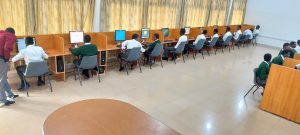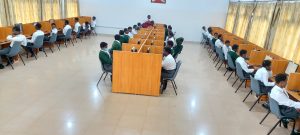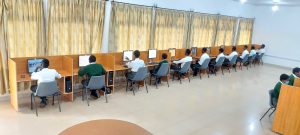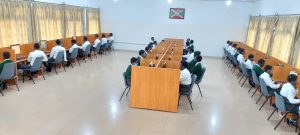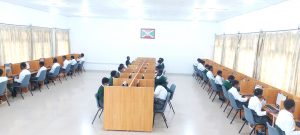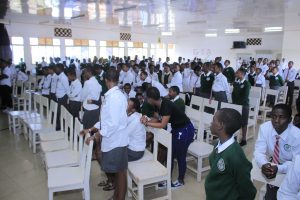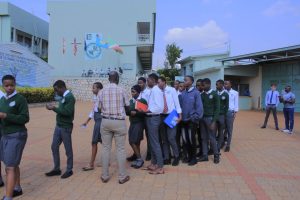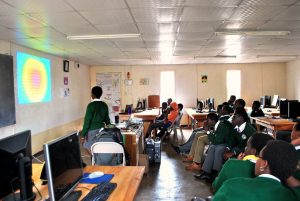Student Life
Students take classes from Monday through Friday. The school day starts at 7:30 and classes end at 15:30. Students generally wake up at about 6:00, have a morning devotional time, eat breakfast, and go to morning assembly at 7:15. Classes are 45 minutes long, with 8 classes per day. There is a 30 minute break after 3rd period and a 1.5 hour lunch after 6th period.After classes end there are a few hours before dinner that are reserved for sport and extracurricular activities.
After dinner, students are expected to study before the lights are turned out at 22:00. Students are served three family-style meals per day in the dining hall. Breakfast is served between 6:45 and 7:20, lunch between 12:30 and 14:00, and dinner between 18:30 and 20:00.
Church
Students are required to attend church services on Sundays. They participate in Bible studies and prayer groups with fellow students throughout the week. The Academy is determined to encourage each student to foster a personal relationship with the Lord.
Health & Wellness
Students receive three proper meals every day served family style in the dining hall. Breakfast is 6:45 to 7:10, Lunch is from 12:30 to 14:00, and Dinner is 18:30 to 19:30.
All students are able to receive medical services at the Shammah Medical Clinic on the grounds of Burundi Youth for Christ Homes of Hope-Gitega.
Community Service
All young men and women at Gitega International Academy are taught the value of community service. Community service events are organized for students to participate in. We believe that since we are a part of the Gitega community, we want to give back to help make the city and the region a better place. Just as the Lord loves each of us, it is important that we show our love for the community.
Dress Code
Young Men’s uniforms consist of a white oxford shirt, red and grey tie, wrought iron pullover, grey pants, black belt, black pants, black socks, and black shoes.
Young Women’s uniforms consist of a white oxford shirt, red and grey tie, wrought iron green pullover, grey skirt, grey stripes socks, and black shoes.
Sports
Students at the Academy can participate in a variety of sports during our after school clubs. These include football, basketball, volleyball, cross country running, badminton, Frisbee, and dodge ball. The Academy aims to cultivate well-rounded students, both academically, physically, and spiritually, who exhibit integrity, excellence, and leadership in everything they do.
Competitions
At G.I.A. we strongly support friendly competition. We encourage our students to work their very hardest to win, but also to keep Christ at the center of their drive to succeed. We are currently registered with the Gitega League of Sports but we also play with various teams around the country.
International Tournaments
GIA is in the process of organizing international trips for students to participate in sports locally and internationally. We believe that this exposure will cultivate a form of patriotism for their own nation as well as appreciate different cultures which they get to interact with.
In February 2016, GIA was privileged to participate in a basketball tournament with other international Christian schools in Africa. The tournament took place in Addis Ababa, Ethiopia. Traveling to a new country and meeting students from schools all over Africa was a wonderful experience for GIA basketball players!
A Christian Perspective on Computing:
- God’s creation of a world that He described as good (Genesis 1);
- humanity’s fall, brought about by our ancestors’ rebellion against God, after which God cursed His creation (Genesis 3); and
- God’s act of redeeming us by sending His son Jesus Christ as a substitute to bear the punishment we deserve (John 3:16, Ephesians 1:7).
That is, God is working to bring humanity and the creation back into a right relation with Himself, a process that began with Jesus’ death (Romans 8:19-23), and that will be completed when His kingdom is finally established (Revelations 21, 22).
One of the distinctives of reformed Christianity is its teaching that all aspects of life have been affected by the fall. Genesis 3 shows this clearly when the fall disrupts people’s relationships with (i) God, (ii) each other, (iii) their work, and (iv) the world around them.
Another reformed distinctive is that Christians are the agents through whom redemption occurs. The idea is that as Christians, we are obliged to live all aspects of our lives in a way pleasing to Him, including our play, our work, and so on—all aspects of life are subject to Jesus’ lordship. By living all facets of our lives consistently with Jesus’ teachings, we redeem those facets, and advance His kingdom.
For the Christian computer scientist, one implication of this is that our work in the area of computing is one of the things to be redeemed. Put differently, humanity’s fall and God’s curse has affected a variety of relationships, including those involving computers. (It is an interesting thought experiment to speculate on how the human-computer relationship might be different if the fall had not occurred.) It is thus important for the Christian computer scientist to consider what aspects of computing are in need of redemption?
Since computers are a part of the creation, and God commanded ourancestors to exercise dominion over the creation (Genesis 1:28), then the proper relationship between people and computers is for people to exercise dominion over computers.
The vast majority of the people I know would describe their relationship with their computer as one of frustration, rather than dominion. Instead of enhancing our productivity and making life simpler, the computer dominates us far more than we dominate it. The reasons for this inversion are numerous: buggy or poorly designed applications, interfaces designed to simplify life for the implementer instead of the end-user, programming languages that seem to be designed with no concern for readability, and so on.
Thus, there are a number of ways that the Christian computer scientist can work to redeem computing:
- One way is to refuse to cut corners, and only design computing systems that are robust, and whose hardware and/or software is as reliableand impervious to crashes as possible. Leaving the testing and finding of errors to one’s end-users is a deplorable practice that only raises a users frustration level.
- Another way is for the Christian computer scientist to build systems whose interfaces are as intuitive as possible for the end-user, and so allow as many people as possible to achieve mastery of the computer. When 80% of Americans cannot program their VCRs, new human-computer interfaces are needed that empower such people, instead of expanding the gap between the techno-literate and the techno-illiterate. In this respect, Christians can also be redemptive by supporting companies who design reliable software and whose interface considers the end-user; and by refusing to support companies that do not.
- In this age of networking, computers must interact not only with humans, but with one another, and so the computer-computer relationship is another area in which relationships can be improved. The development of fault-tolerant network protocols, tools and/or protocols that enable communication throughout a heterogeneous network, tools that simplify network management, and interfaces that make the vast amount of information available easier to access are just a few of the needs.
These are just a few of the areas where the computer scientist who is a Christian can work to redeem computing.
In summary, one task of the Christian computer scientist is to bring healing anywhere that pain exists in the endeavor of computing.
The ACT Test
